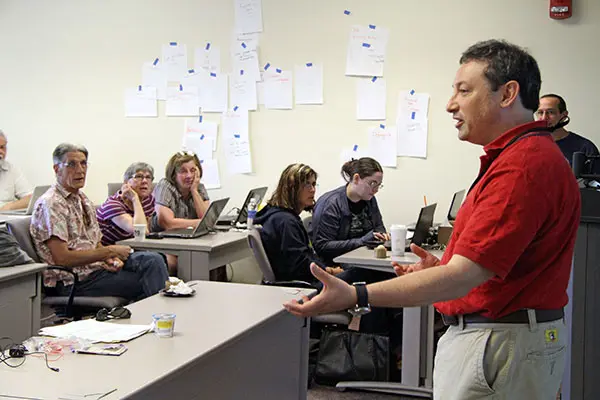State Education Secretary Peyser, Google Adviser to Speak at UMass Lowell

10/24/2017
Media contacts: Nancy Cicco, 978-934-4944 or Nancy_Cicco@uml.edu and Christine Gillette, 978-934-2209 or Christine_Gillette@uml.edu
LOWELL, Mass. – Educators looking to gain the inspiration and tools they need to teach all students to become literate in computer science and to ready the next generation of engineers, coders and industry visionaries will gather at UMass Lowell on Saturday, Oct. 28 for a first-of-its-kind conference.
Massachusetts Secretary of Education James Peyser and Steve Vinter, Google’s executive coach and tech leadership development adviser, are scheduled to deliver keynote addresses at “Working Together to Strengthen K-12 Computer Science,” the first regional conference of the Computer Science Teachers Association (CSTA).
Presented by UMass Lowell and the CSTA’s Greater Boston chapter, the conference is supported by Google and Microsoft Philanthropies with the goal of increasing computer science literacy in elementary, middle and high-school students.
“Computer science is revolutionizing our lives, powering all sorts of devices and products we use every day. There’s growing consensus that computer science should be embedded into K-12 education as required coursework, not merely as electives,” said UMass Lowell Computer Science Prof. Fred Martin, associate dean of student success in the university’s Kennedy College of Sciences. “Only by making computer science a required part of the K-12 curriculum will we provide equity of access to this powerful knowledge. We need to give all students this opportunity to learn about how our world works.”
The conference comes on the heels of the Trump administration’s announcement it wants to provide $200 million a year to the U.S. Department of Education for K-12 education in science, technology, engineering and math (STEM) fields, with a focus on computer science. In response, several corporations – including Google and Microsoft – have stepped up to pledge a total of $300 million to help prepare students for careers in technology.
UMass Lowell is a leader in computer science education at the undergraduate and graduate levels. Along with teaching at the university, Martin, one of the conference’s organizers, serves as the chairman of the CSTA’s board of directors and helped develop K-12 educational standards for digital literacy and computer science that were implemented by the Massachusetts Department of Elementary and Secondary Education last year.
Open to schoolteachers, administrators, technology directors and counselors as well as the public, the conference will include sessions on topics like cybersecurity challenges and how to develop engaging lesson plans for students, particularly those in elementary and middle school. The latter topic is crucial to interesting more girls and students from diverse backgrounds in computer science, according to Martin and others with the CSTA.
“Exposure to and knowledge of computer science is not simply a matter of students obtaining a well-rounded education,” said Padmaja Bandaru, co-president of the CSTA Greater Boston chapter. “This knowledge, and the application of it, is an instrumental part of their futures. Virtually all professions today rely on computing to some degree and this reliance promises to grow more important in the coming years, having a direct and lasting impact on the economic strength of the nation and the world.”
In addition to offering bachelor’s and graduate degrees in computer science, UMass Lowell also provides learning opportunities for students before they reach college. Among them is the “Pathways in Computer Science” summer program that has taught more than 1,200 middle-schoolers in Medford and Everett how to create mobile apps that educate users about their community, such as historic sites in Everett and how to book a visit by the Medford Arts Resources Vehicle. Launched in 2014 and led by Martin with school administrators in the two communities, the program is supported by a $1.2 million grant from the National Science Foundation. With Martin’s help, the Everett and Medford school districts have now adopted a computer science curriculum for all of middle-school students.
“Massachusetts is leading the way in K-12 computer science education, with recently adopted standards and work on teacher licensure,” said conference organizer David Petty, co-president of the CSTA’s Greater Boston chapter. “There are many exciting things happening in schools throughout the rest of New England as well, but teachers and administrators have had few opportunities to get together and collaborate until now. The conference is an important first step toward advancing the state of the art in K-12 computer-science coursework for the region’s students.”
The event will be held from 7:30 a.m. to 3 p.m. on Saturday, Oct. 28 at Olsen Hall on the university’s North Campus, 198 Riverside St., Lowell. Those interested in attending should register at https://csta-uml-2017.eventbrite.com.
UMass Lowell is a national research university located on a high-energy campus in the heart of a global community. The university offers its 18,000 students bachelor’s, master’s and doctoral degrees in business, education, engineering, fine arts, health, humanities, sciences and social sciences. UMass Lowell delivers high-quality educational programs, vigorous hands-on learning and personal attention from leading faculty and staff, all of which prepare graduates to be ready for work, for life and for all the world offers. www.uml.edu
